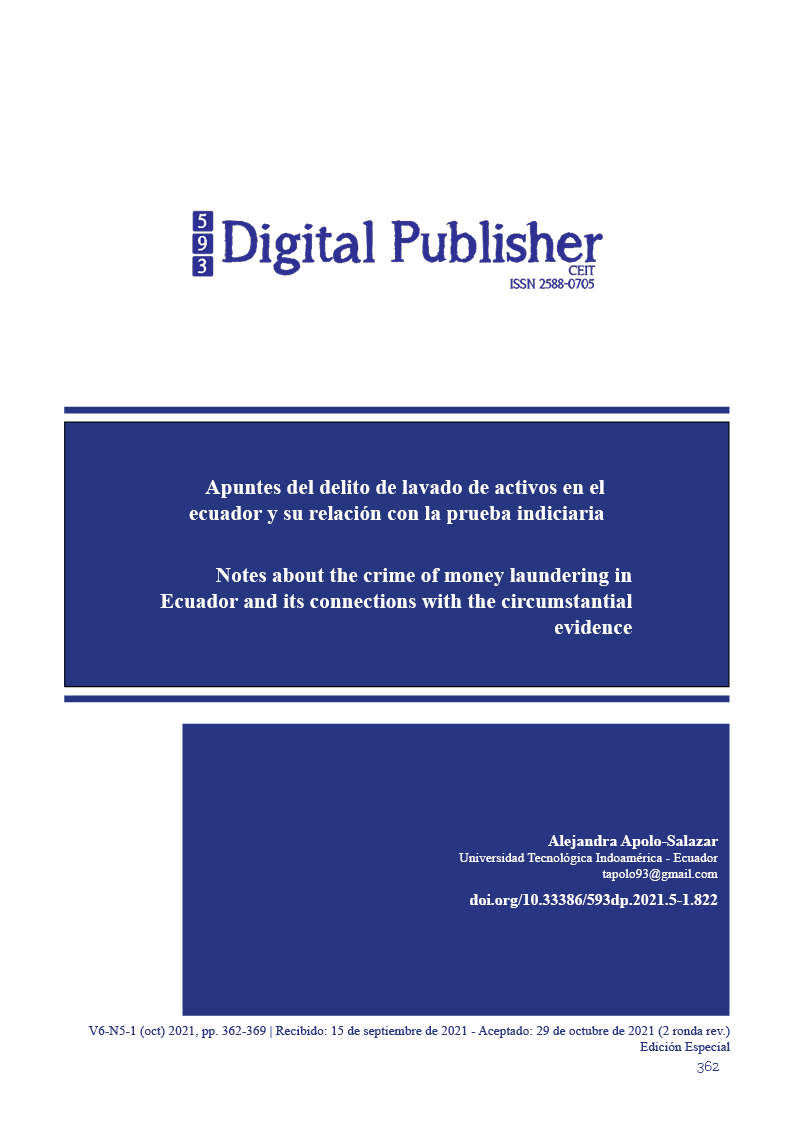Apuntes del delito de lavado de activos en el ecuador y su relación con la prueba indiciaria
Contenido principal del artículo
Resumen
Desde la entrada en vigencia del Código Orgánico Integral Penal, se ha venido formulando estudios que permitan visibilizar lo que implica el tipo penal lavado de activos, en el presente se cavila acerca de lo que implica el onus probandi y cómo se invierte la carga de la prueba, lo que desde el punto de vista del garantismo del Ecuador es atentatoria del efectivo goce de los derechos, aunque se trate del adecuado funcionamiento del sistema económico, no puede soslayarse la tutela judicial efectiva de los derechos ni el debido proceso.
Descargas
Detalles del artículo

Esta obra está bajo una licencia internacional Creative Commons Atribución-NoComercial-CompartirIgual 4.0.
1. Derechos de autor
Las obras que se publican en 593 Digital Publisher CEIT están sujetas a los siguientes términos:
1.1. 593 Digital Publisher CEIT, conserva los derechos patrimoniales (copyright) de las obras publicadas, favorece y permite la reutilización de las mismas bajo la licencia Licencia Creative Commons 4.0 de Reconocimiento-NoComercial-CompartirIgual 4.0, por lo cual se pueden copiar, usar, difundir, transmitir y exponer públicamente, siempre que:
1.1.a. Se cite la autoría y fuente original de su publicación (revista, editorial, URL).
1.1.b. No se usen para fines comerciales u onerosos.
1.1.c. Se mencione la existencia y especificaciones de esta licencia de uso.
Citas
Durrieu, Roberto. El lavado de dinero en la Argentina: análisis dogmático y político-criminal de los delitos de lavado de activos de origen delictivo (ley 25.246) y financiamiento del terrorismo. Historica. Buenos Aires, Argentina: Lexis Nexis Argentina : Librería Editorial, 2006.
Fabián Caparrós, Eduardo A. El delito de blanqueo de capitales. Madrid: Editorial Colex, 1998.
Feijóo Sánchez, Bernardo. Retribución y prevención general: un estudio sobre la teoría de la pena y las funciones del derecho penal. Montevideo: Editorial B. de F [u.a.], 2007.
Jorge, Guillermo, ed. Recuperación de activos de la corrupción. Ciudad Autónoma de Buenos Aires: Editores del Puerto, 2008.
Luigi Ferrajoli. La Globalización y el orden jurídico: reflexiones contextuales. 1. ed. Bogotá: Universidad Externado de Colombia, 2007.
Muñoz Conde, Francisco, y Mercedes García Arán. Derecho penal. Parte general. 4. ed. rev. y Puesta al día. Valencia: Tirant lo Blanch, 2000.
Pabón Gómez, Germán. Lógica del indicio en materia criminal. Santafé de Bogotá: Ediciones Jurídicas Gustavo Ibáñez, 1994.
Zambrano Pasquel, Alfonso. Lavado De Activos (2a. Ed.). S.L.: Corporación De Estudios y Publicaciones, 2020.
Unidad de Información Financiera Argentina, párr. 2, accedido 03 de junio de 2016, http://www.uif.gov.ar/uif/index.php/en/sobre-el-lavado-de-activos/134-lavado-de-activos/99-historia-sobre-el-lavado-de-activos
Diccionario económico, párr. 2, accedido 03 de junio 2016, http://www.expansion.com/diccionario-economico/blanqueo-de-capitales.html
Federación Latinoamericana de Bancos, párr.22, accedido el 03 de junio de 2016, http://www.felaban.net/coplaft/definicion01_2.html
María Jesús Hernández Elvira, La prueba indiciaria en el proceso penal, párr.2, accedido el 04 de junio de 2016, http://icalanzarote.com/docus/articulos/prueba_indiciaria.pdf
Fuentes Normativas
Constitución de la República del Ecuador Registro Oficial No. 449, 20 de octubre de 2008. Vigente.
Código Orgánico Integral Penal, en Registro Oficial Suplemento, No. 180, 10 de febrero de 2014. Vigente.
Ley para Reprimir el Lavado de Activos, en Registro Oficial, No. 127 (18 de octubre de 2005). Derogado.
Código Orgánico Monetario y Financiero, en Registro Oficial, No. 332 (12 de septiembre de 2014). Vigente.


